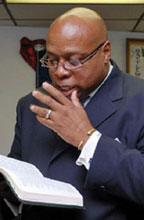
Nelson Mandela
By Pastor Rasheed Z Baaith
“Behold, I have given him for a witness to the people, a leader and commander to the people.” (Isaiah 55:4)
If there is a pantheon of leadership that came from our people and led our people, Nelson Mandela is at the summit of such a list; especially if the criteria is meeting and overcoming the demand of unending sacrifice.
I can’t think of few leaders anywhere in history who have given and lost as much as Nelson Mandela did to free his people. He martyred his marriage, his freedom, the physical prime of his life, watching his children grow up but appeared never to regret having had to do so. For the destruction of apartheid, Mandela was prepared to surrender whatever was needed, including his life. That kind of thinking is rare, that is if it even exists, among leaders of this day.
It is difficult to explain to those who did not live under apartheid and under segregation, what kind of courage it took for someone to stand up and speak truth to a system that watered itself with the blood of those it was exploiting. They cannot imagine the cruelty or fathom the brutality that was both sanctioned and legal. These were political systems designed to break bodies and destroy minds, governments that put practices in place to your spirit and your future.
Those with today’s revisionist mentality regarding the global Civil Rights Struggle often say “it could not have been that bad.” Yeah, it was, too.
But perhaps the most amazing thing about Nelson Mandela was not his surviving all that he did that was meant to destroy him but his determination not to allow what he lived through to be the matrix for hatred. In those whom had imprisoned him and marginalized him, Mandela never saw their violent mercilessness; he only saw their flawed humanity.
When he walked out of prison in 1990, Mandela had been incarcerated for 26 years, 18 of them on Robbin Is-land, a place of cruel detention since colonial times. Two square miles in circumference, it is four miles from Cape Town. The inmates could see Cape Town every day of their lives, ad-ding psychological pains to the physical ones they felt. Mandela and the rest of them would sit on a stool all day breaking rocks and no doubt look where they thought they would never walk again.
Mandela’s cell at Robbin Island was like everyone elses’, eight feet square with thin blankets to cover with as he slept on the floor, although he got a bed in 1978. Ironically, many South A-fricans who were active in the struggle say Robbin Island became “the University of the Struggle.” Because those coming to the prison were taught, indoctrinated and trained by Mandela and the others to see only one South Africa. One where skin color was irrevalent. He tutored them to understand that the revolution he envisaged was about change. Not about replacing one set of oppressors with another. When South Africa hosted the World Cup in 1995, it was at his urging that Black South Africans supported the national team called the Reeboks. A team most of them had grown up hating.
His doing so won over a good number of white South Africans who feared him and doubted his sincerity about there being just one South Africa with one set of laws for all people. Including whites.
Although called “Nelson” almost all of his life, it is not his birth name. Rolihlahia Mandela is. The name “Nelson” was given him by his first teacher. It was the custom of that time for teachers to give South African children European first names when they enrolled in school. But most South Africans and much of the world will remember him as the Father of his country and as one writer put it, “a global icon of humanity’s ability to transcend racism.”
Although Mandela won the 1993 Nobel Peace Prize, the Presidential Medal of Freedom, the Bharat Ratna (Light of India), other numerous awards and was recognized with a great many honorary degrees, Mandela had only this to say of himself, “I was not a Messiah but an ordinary man who had become a leader because of extraordinary circumstances.” Indeed. We will not see his like again.
